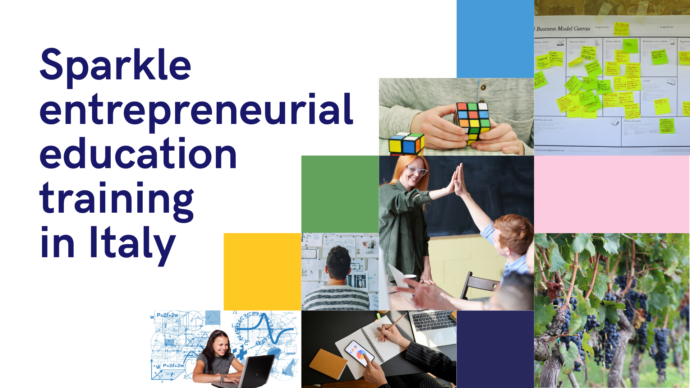The entrepreneurial education training of the Sparkle project aims to integrate the technical skills of future graduates with basic entrepreneurial skills that will enable them to better interpret the needs of farmers and to imagine the wider impact of the PA not only on field practices but also on the agricultural enterprise as a whole.
To do this, two tools have been chosen to represent the reality of the agricultural business as a whole through the key functions of the enterprise and to assess the “impact” of the PA as perceived by farmers.
Through the use of the Business Model Canvas tool, students were able to see how PA can fit organically into the different business functions, changing the relationships between them and affecting the overall performance.
To complement the “Handbook for BUSINESS MODEL CANVAS in the field of SUSTAINABLE PRECISION AGRICULTURE”, a mix of business cases from different sectors – transport, fashion, ICT – was used to facilitate the approach during the online classes. Having verified the flexibility of the tool, which makes it possible to calibrate the level of detail of the study, from the most generic to the most detailed and complex, students proceeded to apply the canvas to the different business cases proposed.
In order to be able to motivate and justify the introduction of PA technologies and practices, the impact analysis matrix made it possible to identify the main critical issues and to “develop” effective solutions aimed at overcoming farmers’ objections.
The Covid19 pandemic crisis prevented visits to farms from being carried out, replaced by online sessions in which students were asked to use the Business Model Canvas and the PA Impact analysis matrix as a track for the 3 interviews with farmers: Siro Pacenti, Marchesi Mazzei and Copernico.
For the Business Canvas Competition Marchesi Mazzei presented a concrete business case and the 3 project groups produced:
- BMC ex ante with the company analysis;
- BMC ex-post with the analysis of the development determined by the introduction of the PA technical solution;
- PA Impact analysis matrix
- video “pitch” of the proposed solution.
The most interesting result of the contest consists in the fact that the students not only tried to find a technical solution to the problem posed by the company Marchesi Mazzei, which was particularly challenging, by sifting through all scientific publications and identifying projects and prototypes still under development. More importantly, they also tried to strengthen the project proposal by broadening the representation of the impact of PA by envisaging unexpected developments: new business areas; new skills required and new strategic approaches.
Overall, distance learning can be considered effective and the entrepreneurial approach – the use of the BMC and Impact Analysis Matrix – has fostered a better communication between students and the company Marchesi Mazzei. However, the integration with the actual visit to the farm and the field test remain decisive elements for verifying the actual impact of the proposed solution.

